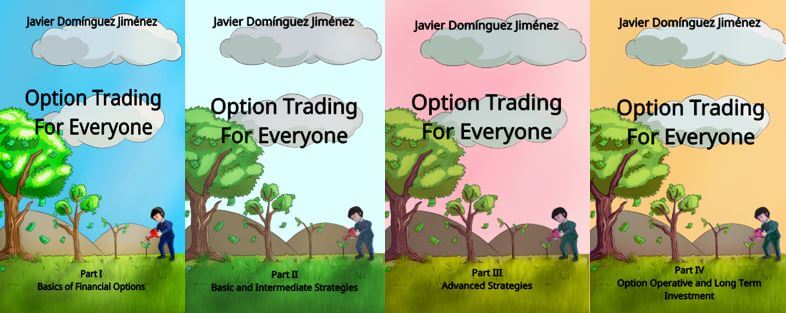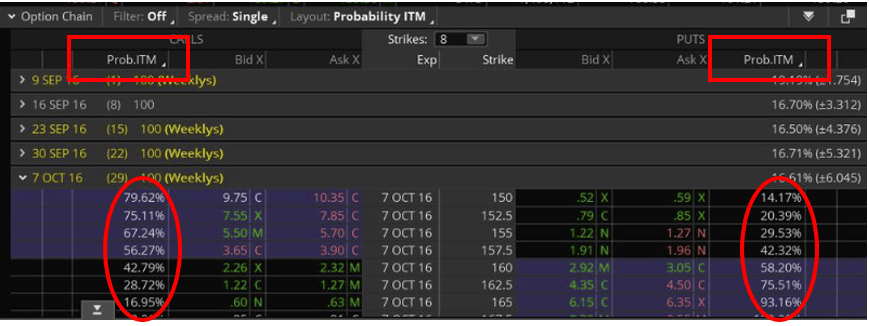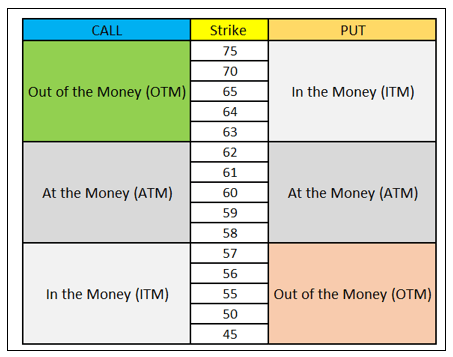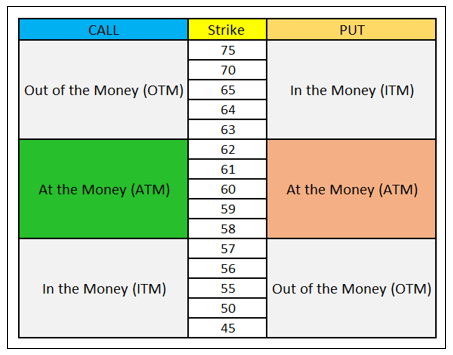Understanding In The Money Options – The Highest Premium Options
An In The Money option is one of the three different states we can find in an option contract attending to the relationship between the underlying price and the strike price.
In this guide, we will learn what exactly an In The Money option is, we will see several in the money option examples, and we will answer other questions such as what happens when an option expires in the money or how to calculate the probability of option expiring In The Money.
Table of Contents
Let us begin with the basics first…
What is In The Money option?
An in the money option is one of the three main states we can find an option contract attending the relationship between the strike price and the price of the underlying asset we are dealing with in the option chain.
An In The Money option is also called ITM option, and they are the most expensive options of the market because of their high intrinsic value.
An In The Money option barely has extrinsic value compared to the Out of The Money options and the At The Money options.
What is In The Money call option then?
We will say we have an In The Money call option when the strike price is below the current underlying price. Check the following image to understand this better.
In The Money call option example
If we had a company whose share prices were $60, all those strike prices under that value would be In The Money options, as the previous table represents.
The reason why they are more expensive is simple. If we trade an In The Money option, if we decided to exercise it, we would be obtaining shares at a lower price than the current stock price.
What is In The Money put option?
In this case, we will say we have an In The Money put option when the strike prices are above the current underlying price.
In The Money put option example
Let us suppose the share prices of Amazon are today at $2,000 per share, all the puts option contracts whose strike prices are above $2,000 are In The Money put options.
It works exactly the opposite of the call options.
An In The Money option example with more details
Let us take another example with Amazon when the current share price is $2,000. For instance, let us suppose we open the Amazon options chains, and we buy a call option whose strike price is $1800.
If we exercised our rights after purchasing the option, we would get 100 shares worth 1,800 $ each after paying the corresponding option premium plus the price of the 100 shares multiplied by 1,800$ for them, even when the current share prices are 2000 $.
Typically, the total amount of the premium we paid, together with the sum of what we have to pay to buy those shares at $1800, will result in practically the same as if we decided to purchase the shares in the stock market.
The same applies to those In The Money put option contracts. If we bought and exercised an In The Money put option at $2200, that would be the equivalent of having acquired a short position when the stock price was at $2200, even though today it is at $2000. And again, we will have to pay a much more expensive premium for this option.
What is Deep In The Money option?
A Deep In The Money option is an In The Money contract whose strike price is very far away from the current underlying price. Typically, a Deep In The Money option will have delta over 0.9 or so and practically a non-existent extrinsic value.
Following our Amazon example, a Deep In The Money call option would be the $1200 strike price.
While a Deep In The Money put option would be any strike price over $2800 or so.
In both cases, the Deep In The Money option has a delta over the 0.9 threshold.
Why buy an In The Money option?
The reason why someone would buy an In The Money option is the following. Imagine we want to buy a stock that we believe is going to rise in the future. However, we do not have enough money to pay for the stock.
Instead, what we can do is to buy an In The Money option with a somewhat high delta, because it will be cheaper than buying the stock in the market. An In The Money option with a high delta is going to assure us that our option contract is going to obtain practically the same value as the stock when this one rises.
By buying an In The Money option, we will be using the power of leverage in our favor to obtain practically the same results that a stock trader would get by buying the shares.
However, on the other hand, selling In The Money call option is quite a risky maneuver because it is almost certain that we will be assigned and lose money.
We have also made a comparation between the metrics of those In The Money Options vs Out of the Money options here.
How to exercise In The Money options?
If we desire to exercise our In The Money options because we want the shares, the only thing we have to do is notify this to our broker.
When we decide to exercise, we will have to pay the value of the stock at the strike price of our In The Money option contract, so we should have the necessary amount in our account.
What happens when In The Money option expires?
Two things can happen when an In The Money option expires, and they depend on the policy of the broker we are trading with.
When an option expires, our broker proceeds to exercise our rights to obtain the shares we have bought the contract, but only if we have asked it to do so. If we do not have enough money in our account to pay the total amount of the shares, we should be selling our contracts instead.
In any case, our broker will notify us a few days in advance when an option is about to expire, so we can decide what to do. If we choose to do nothing, the option contract will expire without any value, and we will lose any profit that may have been generated.
The ideal in these cases is to sell the contract directly in the market, because if we cannot pay for the shares, we will at least make a profit by making the direct sale. This is why, when we are buyers, we must be aware of the upcoming expiration dates.
Even so, the broker usually warns us that the event will happen when one week remains to the expiration date. Take a look at this notification our broker shows us when some options are about to expire.

Here, you can see a message receive from our broker when an option is about to expire
However, when we are selling In The Money option, unless we close the transaction by repurchasing the contract, the broker will assign us the obligation to provide the buyer with the shares that we had promised.
In that case, we must give the buyer the 100 shares if we were selling In The Money call option, or -100 shares in case we were selling In The Money put options.
If you want to know what happens if there is no buyers, click here.
- First: if we have the titles in our portfolio, the broker will take them at the end of the current market day and deliver them to the buyer. In this case, we will have lost our shares on the spot.
- Second: If we don’t have the shares, the broker will assign us the opposite position to the one we sold. That is, if we sold an In The Money call option, as we owe the buyer 100 shares, we would have a short position of -100 shares held in our portfolio. If we sold an In The Money put option, since we owe the buyer a short position of -100 shares, in our portfolio, we would have 100 shares in our favor.
In both cases, we will have an outstanding debt to settle with the broker, since the money that has been used to hold both the short or long position is not ours, unless we can pay it.
In these cases, the broker will send us a message alerting us that we have been assigned an option position and that we need to undo it as soon as possible or add more funds to pay it off.
In these cases, we will simply sell the shares in the market if we end up assigned. It is was a call option assignment; we must buy back the short position at whatever the market price is to try to settle that money imbalance.
Although it can be an unpleasant event at first and can scare off the novice trader who tends to walk away from selling options, the truth is we shouldn’t back out. At the end of the day, the option broker deals with this type of situation constantly, so it’s not unusual.
Do you need a Calculator that helps you create and analyze any option strategy in record time?
How to calculate probability of In The Money option?
Some brokers will show us data that tells us the probability of In The Money option to end up being assigned of a particular option.
While it is true that not all the brokers provide this data, there is an alternative way to calculate the probability of In The Money option being assigned or not. That is done with the greek delta, and you can find more about it in this article here.






